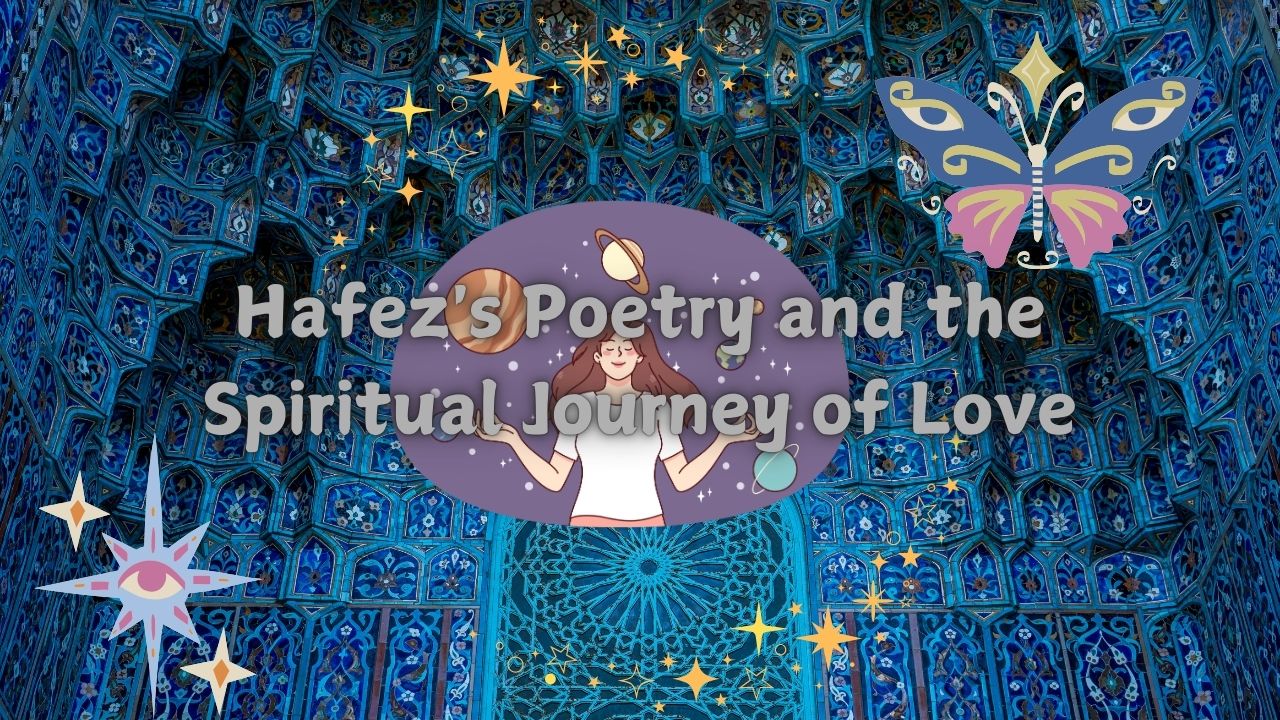Hafez Shirazi, one of the most revered poets of Persian literature, is celebrated for his masterful ghazals that explore themes of love, spirituality, and the human experince of worldly life and love. His poetry often intertwines the physical and the divine, using metaphors of wine, love, and nature to express profound spiritual truths. In one of his iconic ghazals, Hafez dives deep into the complex emotions that come with love, longing, and loss.
Ghazal in Persian:
ما را زِ خیالِ تو چه پروایِ شراب است؟
خُم گو سر خود گیر، که خُمخانه خراب است
گر خَمر بهشت است بریزید که بی دوست
هر شَربَتِ عَذبَم که دهی، عینِ عذاب است
افسوس که شُد دلبر و در دیدهٔ گریان
تحریرِ خیالِ خطِ او نقشِ بر آب است
بیدار شو ای دیده که ایمن نتوان بود
زین سیلِ دمادم که در این منزلِ خواب است
معشوق عیان میگذرد بر تو، ولیکن
اغیار همیبیند از آن بسته نقاب است
گل بر رخِ رنگین تو تا لطفِ عرق دید
در آتشِ شوق از غمِ دل، غرقِ گلاب است
سبز است در و دشت بیا تا نگذاریم
دست از سرِ آبی که جهان جمله سراب است
در کُنجِ دِماغم مطلب جای نصیحت
کـاین گوشه پر از زمزمهٔ چنگ و رَباب است
حافظ چه شد ار عاشق و رند است و نظرباز
بس طُورِ عجب لازمِ ایامِ شباب است
Translation of Hafez's Ghazal
What need have I for wine when lost in thoughts of you?
Let the wine jar care for itself, for the tavern is in ruin.
If the wine of paradise is served, pour it out, for without you,
Every sweet drink you offer is pure torment.
Alas, my beloved is gone, and in my tearful eyes,
The image of his delicate script is like drawing on water.
Wake up, O eye, for there is no safety,
From this endless torrent in the realm of sleep.
The beloved passes by, clear before you,
Yet strangers see him, for his face is veiled.
The rose on your blushing cheek, when kissed by dew,
Melts into rosewater, consumed by love's fire and grief.
The fields and plains are green, come, let us not abandon,
The clear water, for this world is all but a mirage.
Do not seek to counsel me in the corner of my mind,
For this corner is filled with the murmurs of the harp and lute.
What of it if Hafez is a lover, rogue, and a gazer?
Many a wondrous state is necessary for the days of youth.
The Futility of Worldly Pleasures Without Love
The opening lines of this ghazal set the tone by questioning the need for worldly pleasures like wine when the heart is preoccupied with thoughts of the beloved. Hafez dismisses the traditional symbol of intoxication—the wine jar—by pointing out that the tavern, a metaphor for worldly indulgence, lies in ruin. This reflects a deeper spiritual state: once a person becomes absorbed in the thought of their beloved, material joys lose their charm. The "wine of paradise" itself is undesirable if the beloved is absent, highlighting the ultimate importance of love over all other pleasures. To Hafez, without love, even paradise becomes a source of pain.
The Ephemeral Nature of Life and the Elusiveness of Love
Hafez's poetry often revolves around the transient nature of life, symbolized by images like drawing on water. In this ghazal, he laments how the memory of his beloved, even when carefully cherished, dissipates like a fleeting vision, leaving only sorrow in its wake. This reflects the larger theme of impermanence that is central to Hafez’s worldview. Life, like the beloved’s image, is delicate and transient, constantly slipping away despite our best efforts to hold on.
The poet also warns of the dangers of complacency. In a dream-like state, one might miss the fleeting moments of beauty and love. The command to "wake up" suggests that we must remain vigilant in our pursuit of the divine or the beloved, for time flows like a relentless river. If we do not seize the moment, the opportunity to experience true love or spiritual awakening may pass us by.
The Beloved’s Hidden Beauty and the Rose Metaphor
The image of the beloved passing by, yet remaining veiled from view, introduces a profound spiritual metaphor. Hafez often speaks of the divine as something that is always present but remains hidden to the unworthy or the inattentive. In this ghazal, even though the beloved walks openly, his face remains veiled to the poet, representing the hidden nature of the divine or the elusive truth that can only be glimpsed by the enlightened.
The comparison of the beloved’s blushing cheek to a rose being kissed by dew evokes a delicate image of beauty, consumed by the fires of love and sorrow. Here, Hafez uses nature to reflect the intensity of emotions—the rose, a symbol of beauty, is dissolved in the very essence of love, symbolized by rosewater. This metaphor suggests that beauty, love, and sorrow are inextricably linked, each feeding into the other.
Life as a Mirage
In the later verses, Hafez returns to a theme common in his poetry: the illusory nature of the material world. The world is compared to a mirage, a deceptive appearance of something real. The poet urges his audience to not be deceived by the world's fleeting attractions, calling for a focus on what is eternal and meaningful—love, whether for a physical beloved or the divine. The clear water, a symbol of truth and purity, must not be abandoned for the illusions of life.
The Spirit of Youth and Rebellion
Hafez ends the ghazal with a playful reflection on his identity. He embraces his role as a lover, a rogue, and a gazer of beauty, defending it as a necessary part of the youthful experience. This line captures Hafez’s view that to be fully alive, one must engage with the world passionately and without regret, even if it means transgressing societal norms. For Hafez, love—whether romantic, physical, or spiritual—demands a certain amount of rebellion and courage. The “wondrous states” of youth are not to be feared but celebrated as part of the human journey toward deeper understanding.
Conclusion: Hafez and the Search for Truth
In this ghazal, Hafez reflects on the futility of worldly pleasures without the presence of love, the fleeting nature of life, and the hidden beauty of the divine. His poetry serves as a reminder to stay vigilant in our search for love and truth, for they are the only lasting realities in a world of illusions. Like the rose melting into rosewater, love transforms and transcends, dissolving all distinctions between beauty, sorrow, and joy. Through his metaphors of wine, water, and the beloved, Hafez invites us to look beyond the surface of life and seek what lies beneath—the eternal essence of love.





